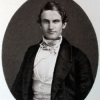Francis Parkman

Francis Parkman
Francis Parkman, Jr.was an American historian, best known as author of The Oregon Trail: Sketches of Prairie and Rocky-Mountain Life and his monumental seven-volume France and England in North America. These works are still valued as historical sources and as literature. He was also a leading horticulturist, briefly a professor of Horticulture at Harvard University and author of several books on the topic. Parkman was a trustee of the Boston Athenæum from 1858 until his death in 1893...
NationalityAmerican
ProfessionHistorian
Date of Birth16 September 1823
CountryUnited States of America
Few passages of history are more striking than those which record the efforts of the earlier French Jesuits to convert the Indians.
Faithfulness to the truth of history involves far more than a research, however patient and scrupulous, into special facts. Such facts may be detailed with the most minute exactness, and yet the narrative, taken as a whole, may be unmeaning or untrue. The narrator must seek to imbue himself with the life and spirit of the time. He must study events in their bearings near and remote; in the character, habits, and manners of those who took part in them. He must himself be, as it were, a sharer or a spectator of the action he describes.
The raft was at length complete. We piled our goods upon it, with the exception of our guns, which each man chose to retain in his own keeping.
Crossing the Penobscot, one found a visible descent in the scale of humanity.
The reader need not be told that John Bull never leaves home without encumbering himself with the greatest possible load of luggage. Our companions were no exception to the rule.
A few hours' ride brought us to the banks of the river Kansas.
A military road led from this point to Fort Leavenworth, and for many miles the farms and cabins of the Delawares were scattered at short intervals on either hand.
The fortified towns of the Hurons were all on the side exposed to Iroquois incursions.
The great medley of Oregon and California emigrants, at their camps around Independence, had heard reports that several additional parties were on the point of setting out from St. Joseph's farther to the northward.
Riding in advance, we passed over one of these great plains; we looked back and saw the line of scattered horsemen stretching for a mile or more; and far in the rear against the horizon, the white wagons creeping slowly along.
We were soon free of the woods and bushes, and fairly upon the broad prairie.
We were now arrived at the close of our solitary journeyings along the St. Joseph's trail.
Here society is reduced to its original elements, the whole fabric of art and conventionality is struck rudely to pieces, and men find themselves suddenly brought back to the wants and resources of their original natures.
We were in all four men with eight animals; for besides the spare horses led by Shaw and myself, an additional mule was driven along with us as a reserve in case of accident.